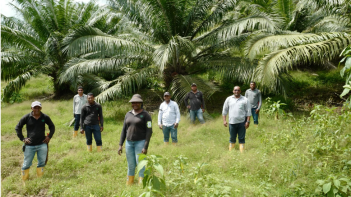At the GA 12 in November 2015 the Resolution 6h was passed that committed the RSPO to ensuring the quality, oversight and credibility of RSPO assessments by developing clear and mandatory guidelines and to improve the quality of High Conservation Value (HCV), High Carbon Stock (HCS) and Social and Environmental Impact Assessment (SEIA) and Free Prior & Informed Consent (FPIC) review in the New Planting Procedure (NPP) assessments, as well as to monitor the quality, independence and performance of all RSPO Auditors.
Resolution 6h requires the RSPO Secretariat to act in coordination with the members and in accordance with ISEAL procedures, and to ensure: (i) develop clear, mandatory guidelines on the minimum acceptable quality of HCV assessments; (ii) develop clear, mandatory guidelines on assessments of FPIC in the New Planting Procedure; (iii) develop and institute a transparent and robust system for monitoring the quality of assessments; (iv) monitor the quality and performance of Auditors and pursue suspensions or sanctions against underperforming or persistent offenders; (v) monitor RSPO members’ adherence to required procedures and report all members that omit submitting NPP notifications before clearing lands to the Complaints Panel.
The RSPO Secretariat established an Assurance Task Force (TF) which drives the implementation of the Resolution 6H. A Steering Group composed of members of the RSPO BoG offers oversight. A Reference Group comprising of experts in specific fields is invited to provide feedback and advise. Accreditiation Services Internal (ASI) and the High Conservation Value Resources Network (HCVRN) act as independent implementing counterparts. Although work to implement the Resolution started soon after the GA endorsed the Resolution, communication to the members of RSPO and those submitting the Resolution in particular, has been lacking. Involvement of the Reference Group started a too late a stage. This shortcoming is acknowledged by both the RSPO Board and Secretariat and as of now communication and ensurance of an inclusive process will be taken up with priority.
Actions to implement the Resolution include compliance audits conducted by ASI on certification bodies, a publicly accessible RSPO Lead Auditors registry by HCVRN in conjunction with the exisisting Assessor Licensing Scheme and CB competency trainings by the Secretariat. Compliants— low threshold..ASI During the initial phase, a number of conclusions and further recommendations were identified. RSPO and its counterparts ASI and HCVRN will move towards further improvements which needs to include online reporting, a harmonized complaints management system, increased transparency around CB performance and data analysis. Elements which, as per the Resolution, will receive priority attention include: (i) developing a list of minimum requirements for assessments – to be adopted and employed by HCVRN, (ii) mandatory guidelines on assessments of FPIC in the New Planting Procedure – building on RSPO’s revised FPIC Guidance (2016), (iii) a transparent procedure for monitoring assessment quality to be adopted and employed by ASI, (iv) mechanisms for routine reviews of Auditors performance and a system for sanctioning offenders (ASI), (v) monitor RSPO members’ adherence to required procedures and report all members that omit submitting NPP notifications before clearing lands to the Complaints Panel (RSPO Secretariat).
During the RT 14 a plenary debate and was dedicated to Resolution 6H and the Assurance TF invited the Steering Committee, Reference Group and other concerned parties to further discuss the above mentioned and other required actions during the next phase of implementation. A list of prioritised areas of attention for further action and possible contribution by the different RSPO members and external experts was agreed upon. During the RSPO GA 13 RSPO indicated an inclusive process will be followed with 3 monthly progress updates published on the RSPO website.
Keep reading

Access into prisma

Updated Trace Function in prisma

Call for Expression of Interest: Independent Investigation of a Complaint

Latin American Smallholders, Key Global Brands Gather in Peruvian Amazon to Advance Sustainable Palm Oil

RSPO Forum for Members and Certification Bodies 2025: Strengthening Capacities and Building Bridges with RSPO Members

From Violence to Prosperity: Cultivating Sustainable Palm Oil in San Pablo, Colombia

Palmas de Tumaco: Enduring, Trusting, and Transforming in Colombia’s Pacific Coast
Carry Over Credits for Certified Independent Smallholder Groups




